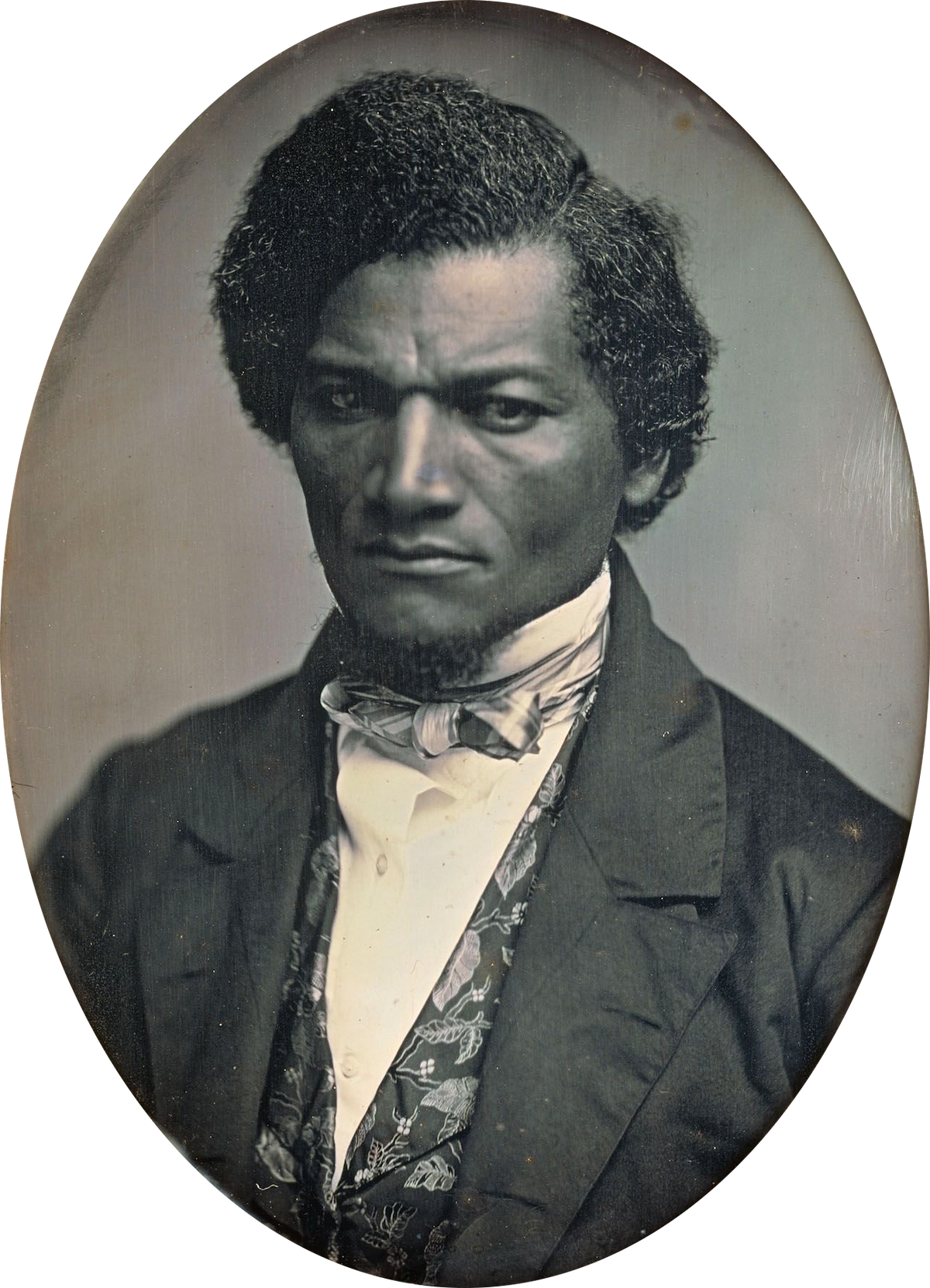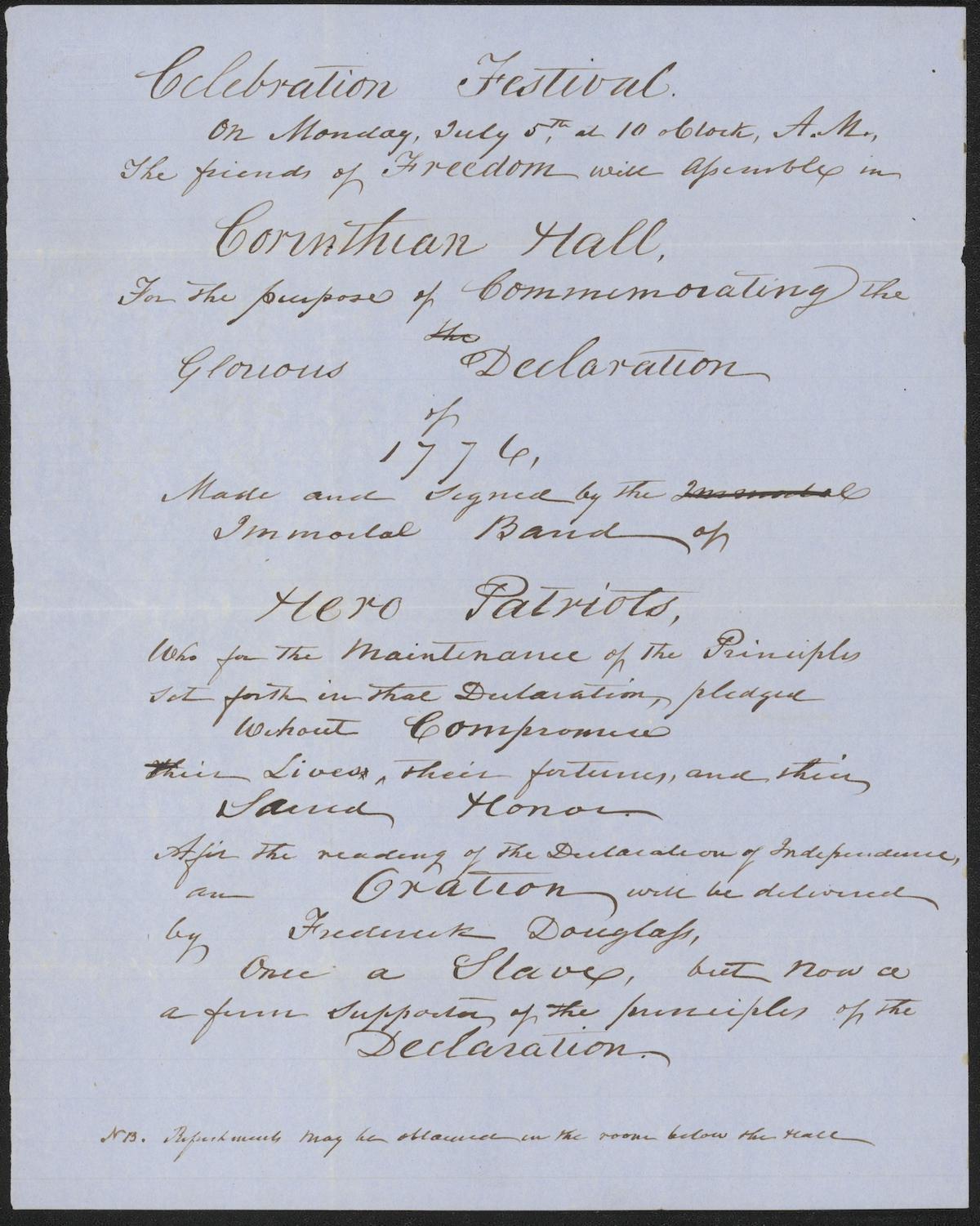The 4th of July Address, delivered in Corinthian Hall, by Frederick Douglass, is published on good paper, and makes a neat pamphlet of forty pages. The ‘Address’ may be had at this office, price ten cents, a single copy, or six dollars per hundred.
– Advert in Frederick Douglas’ Paper, July 13 1852

Daguerreotype of Frederick Douglass
Samuel J. Miller; American, 1822-1888 – Art Institute of Chicago
One week after Frederick Douglas (c. 14 February 1818 – February 20, 1895) had on July 5th, 1852, addressed a crowd of fellow abolitionists at Corinthian Hall in Rochester, New York, his speech was published in the Frederick Douglass’ Paper (formerly The North Star).
Titled “Oration, Delivered in Corinthian Hall, Rochester by Frederick Douglass, July 5th, 1852“, Douglass’ searing words on the horror and hypocrisy of black slavery in the US became known as “What to the Slave Is the Fourth of July?” in an excerpt printed in Douglass’ 1855 autobiography (his second of three such works) My Bondage and My Freedom.
After escaping from slavery in Maryland, Douglas had become a national leader of the abolitionist movement in Massachusetts and New York, becoming known for his oratory and incisive antislavery writings. His reply to his question was to the point:
What, to the American slave, is your 4th of July? I answer: a day that reveals to him, more than all other days in the year, the gross injustice and cruelty to which he is the constant victim. To him, your celebration is a sham; your boasted liberty, an unholy license; your national greatness, swelling vanity; your sounds of rejoicing are empty and heartless; your denunciations of tyrants, brass fronted impudence; your shouts of liberty and equality, hollow mockery; your prayers and hymns, your sermons and thanksgivings, with all your religious parade, and solemnity, are, to him, mere bombast, fraud, deception, impiety, and hypocrisy—a thin veil to cover up crimes which would disgrace a nation of savages. There is not a nation on the earth guilty of practices, more shocking and bloody, than are the people of these United States, at this very hour.

Handwritten broadside announcing the 4th of July celebration (on the 5th) at which Frederick Douglass spoke; from the Rochester Ladies’ Anti-Slavery Society papers at William L. Clements Library, Michigan
The conclusion to his address was a message of hope:
While drawing encouragement from the Declaration of Independence, the great principles it contains, and the genius of American Institutions, my spirit is also cheered by the obvious tendencies of the age. Nations do not now stand in the same relation to each other that they did ages ago. No nation can now shut itself up from the surrounding world, and trot round in the same old path of its fathers without interference. The time was when such could be done. Long established customs of hurtful character could formerly fence themselves in, and do their evil work with social impunity. Knowledge was then confined and enjoyed by the privileged few, and the multitude walked on in mental darkness.
But a change has now come over the affairs of mankind. Walled cities and empires have become unfashionable. The arm of commerce has borne away the gates of the strong city. Intelligence is penetrating the darkest corners of the globe. It makes its pathway over and under the sea, as well as on the earth. Wind, steam, and lightning are its chartered agents. Oceans no longer divide, but link nations together. From Boston to London is now a holiday excursion. Space is comparatively annihilated. Thoughts expressed on one side of the Atlantic are, distinctly heard on the other. The far off and almost fabulous Pacific rolls in grandeur at our feet.
The Celestial Empire, the mystery of ages, is being solved. The fiat of the Almighty, “Let there be Light,” has not yet spent its force. No abuse, no outrage whether in taste, sport or avarice, can now hide itself from the all-pervading light. The iron shoe, and crippled foot of China must be seen, in contrast with nature. Africa must rise and put on her yet unwoven garment. “Ethiopia shall stretch out her hand unto God.” In the fervent aspirations of William Lloyd Garrison, I say, and let every heart join in saying it:
God speed the year of jubilee
The wide world o’er
When from their galling chains set free,
Th’ oppress’d shall vilely bend the knee,
And wear the yoke of tyranny
Like brutes no more.
That year will come, and freedom’s reign,
To man his plundered fights again
Restore.God speed the day when human blood
Shall cease to flow!
In every clime be understood,
The claims of human brotherhood,
And each return for evil, good,
Not blow for blow;
That day will come all feuds to end.
And change into a faithful friend
Each foe.God speed the hour, the glorious hour,
When none on earth
Shall exercise a lordly power,
Nor in a tyrant’s presence cower;
But all to manhood’s stature tower,
By equal birth!
THAT HOUR WILL, COME, to each, to all,
And from his prison-house, the thrall
Go forth.Until that year, day, hour, arrive,
With head, and heart, and hand I’ll strive,
To break the rod, and rend the gyve,
The spoiler of his prey deprive—
So witness Heaven!
And never from my chosen post,
Whate’er the peril or the cost,
Be driven.
In 2008, James Earl Jones read excerpts from Frederick Douglass’ speech:
You can read the speech in full at the Rochester University site here,
Via: PublicDomainReview
Would you like to support Flashbak?
Please consider making a donation to our site. We don't want to rely on ads to bring you the best of visual culture. You can also support us by signing up to our Mailing List. And you can also follow us on Facebook, Instagram and Twitter. For great art and culture delivered to your door, visit our shop.


